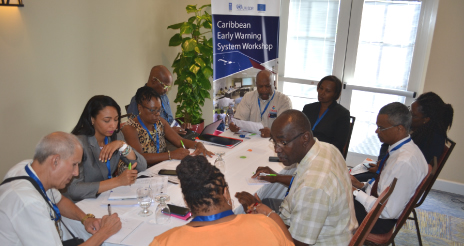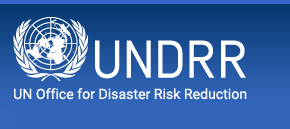- Our Mandate
- Mission and Objectives
- UNDRR in the UN
- Work Programme & Annual Reports
- Results Based System
- Work Partnerships
- Headquarters - Geneva
- SG-UN representatives for DRR
- Regional Office – The Americas and the Caribbean
- Head of the Regional Office – The Americas and the Caribbean
- What is Disaster Risk Reduction?
- What is the International Strategy?
- History of UNDRR
Strengthening Early Warning Systems in the Caribbean
 Photo: Clive Murray / CDEMA
Photo: Clive Murray / CDEMA
By UNDRR Americas
CHRIST CHURCH, Barbados 19 April, 2016 – The institutionalization and harmonization of Early Warning System (EWS) as well as integrating vulnerable groups in all processes related to EWS were the main themes of the Caribbean Early Warning System Workshop that took place last week, in which more than 70 participants from National Disaster Management Agencies, National Meteorological Services, National Red Cross Societies, Non-Governmental Organizations as well as regional, research, intergovernmental and United Nations organizations identified next steps on how to enhance coordination among stakeholders towards the harmonization of multi-hazard EWS in the Caribbean.
The Caribbean is a region prone to natural hazards such as floods, hurricanes, landslides, earthquakes, volcanoes and tsunamis. In addition to a particular exposure, Caribbean countries have comparatively high vulnerability and although many efforts in disaster risk reduction have been made over the past years, including strengthening of EWS, there are still gaps in terms of preparedness.
Mr. Ronald Jackson, the Executive Director of the Caribbean Disaster Emergency Management Agency (CDEMA), referred to the current strain on national budgets across the region which makes efforts to prioritize, advance and sustain early warning systems difficult. He stated, “… it means therefore that we have to better join up our individual efforts, mandates and convening power to ensure that as key stakeholders nationally and regionally, we are maximizing on limited resources, setting realistic expectations and delivering on them in a way that results in positive and sustainable results at the national and community level.” Mr. Jackson therefore described the Caribbean Early Warning System Workshop as relevant and timely in seeking to promote harmonization of EWS.
In addition, Ms. Elizabeth Riley, the Deputy Director of CDEMA, emphasized the fact that although all groups need to be involved in EWS, Governments, including National Disaster Management Offices, have a special role to play in providing the legal and institutional environment by enacting the Comprehensive Disaster Management (CDM) model legislation and policy which speaks strongly to multi-hazard EWS in both the legislation and regulations.
During this three-day regional event, the following findings and recommendations were also put forward:
|
Early Warning Systems are well-recognized as a critical life-saving disaster risk reduction tool. The Sendai Framework for Disaster Risk Reduction 2015-2030 refers to early warning systems as a critical element for disaster risk reduction. One of the seven global targets is calling for a substantial increase of multi-hazard early warning systems which are also an important element to implement the Sendai Framework. Furthermore, the development, maintenance, sustainability and strengthening of early warning systems is part of the 2014-2024 CDM strategy. In this regard, partners including the European Commission Humanitarian Aid and Civil Protection Department (ECHO) are supporting related actions.
This workshop was held from 14 to 16 April in Barbados under the leadership of CDEMA. It was jointly organized by the United Nations Development Programme (UNDP) Barbados and the Organization of Eastern Caribbean States (OECS), the International Federation of Red Cross and Red Crescent Societies (IFRC) and the United Nations Office for Disaster Risk Reduction (UNDRR) in close collaboration with CDEMA, under the framework of the Caribbean Action Plan 2015-2016 of ECHO’s Disaster Preparedness Programme (DIPECHO).
Related links:
Caribbean Early Warning System Workshop
Model Comprehensive Disaster Management legislation and regulations, CDEMA, 2013
Follow the UNDRR news online:
 Now we have twitter account @UNDRR Américas y el Caribe
Now we have twitter account @UNDRR Américas y el Caribe
JOIN US!
Tweets por el @UNDRR Américas y el Caribe
